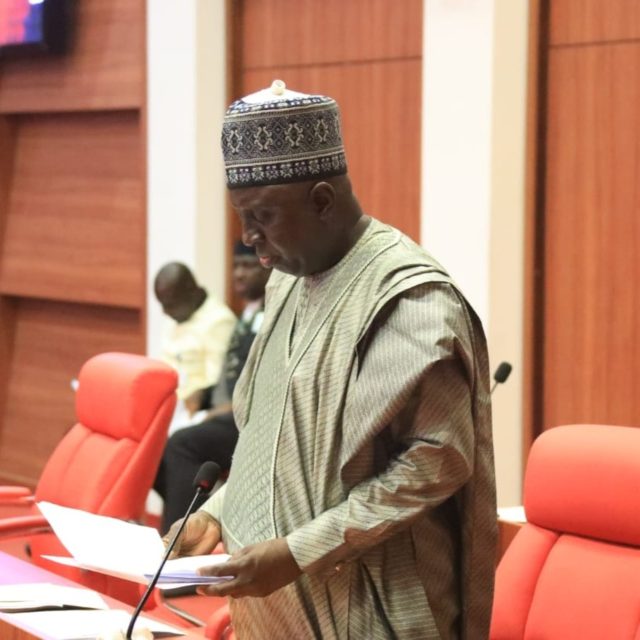Chairman of the Senate Committee on Health says factors responsible for brain drain in Nigeria are multifaceted, and a mere denial of full practice license to medical practitioners, as contained in the bill, might aggravate the issues rather than resolve them.

READ ALSO: MVP Hall of Fame: 20 National Assembly Members make Semi-Final Shortlist
The lawmaker representing Kwara Central Senatorial District, Ibrahim Yahaya Oloriegbe, has described the legislative proposal mandating five-year practice in Nigeria for Medical and Dental Practitioners before being awarded a licence, as a less-effective strategy to address the challenge of brain drain in the health sector.
Senator Oloriegbe, who chairs the Committee on Health at the Red Chamber, lent his voice to conversations around the subject on Friday via his official Twitter handle, where he stated that the proposed piece of legislation, at a minimum, violates the right to the freedom of movement (Section 41) and the right to freedom from discrimination under (Section 42) as guaranteed by the Constitution of the Federal Republic of Nigeria (CFRN) 1999, as amended.
Offering his perspective on the issue, the medical doctor-turned-politician noted that the issues and facts related to granting of practising license are not understood by the bill sponsor of the bill, adding that the development made it imperative for him as a stakeholder in the health sector to weigh in.
According to the Kwara lawmaker, the factors responsible for brain drain in Nigeria are multifaceted, and a mere denial of full practice license to medical practitioners, as contained in the proposal, might aggravate the issues rather than resolve them.
Noting that medical doctors are not the only professionals leaving the country for greener pastures abroad, he highlighted that other health workers, as well as trained professionals in other fields of human endeavour, leave the country daily for similar purposes. He, therefore, stressed that to focus attention only on medical doctors is like curing one of many ailments threatening the life of a dying patient without finding solutions to the others.
The former Leader of the Kwara State Assembly also stated that before the bill can be considered for legislative passage and executive approval, some posers need to be dealt with; which he described as “fundamental issues (that) are important to scrutinise.”
READ ALSO: “How the Mental Health Act benefits Nigerians | Senator Oloriegbe sits with OrderPaper
Top among the posers put forward by Senator Oloriegbe include: “When does the 5-year period start, before or after the housemanship?, What sort of license will be awarded to a fully trained doctor instead of a full license to practise under the proposal?”
In recommending solutions to the dilemma, the lawmaker noted that to achieve the goal of a mandatory work scheme, the country needs to enable a system that guarantees employment opportunities for medical professionals after their qualification and provides inflation-adjusted living earnings for a few years after graduation; on the condition that they stay in Nigeria to practice.
Read the full text below:
MY POSITION ON THE BILL TO MAKE IT MANDATORY FOR MEDICAL AND DENTAL PRACTITIONERS NOT TO BE GIVEN FULL PRACTISING LICENSE UNTIL FIVE YEARS AFTER GRADUATION TO STEM BRAIN DRAIN.
“As the Chairman Senate Committee on Health, a stakeholder in Nigeria’s Health Sector, and a health system specialist, I am of the view that the legislative proposal sponsored by Hon. Ganiyu is not enough as a strategy to address the challenge of brain drain in the health sector.
This is because the factors responsible for brain drain are multifaceted, and the mere denial of full practice license to medical practitioners, as contained in the proposal, will never resolve and may even aggravate them.Besides, it is not only medical doctors that are leaving the country for greener pastures abroad; there are other health workers, as well as professionals in other fields of human endeavour, trained but leaving the country on daily basis for similar purposes, consequently, focusing attention only on the medical doctors is like curing one of many ailments that are threatening the life of a dying patient without finding solutions to the others.In addition, with all due respect, the issues and facts related to granting of practising license are not understood by the sponsor of the bill. Thus, it becomes imperative for me as a stakeholder in the health sector to offer my perspective, this time as a medical practitioner of many years and not particularly as a senator with the privilege of heading the Senate Committee on Health.
The piece of the proposed legislation, at a minimum, violates the right to the “Freedom of Movement” (Sec. 41) and “The right to freedom from discrimination” under (Sec. 42) as guaranteed by the Constitution of the Federal Republic of Nigeria (CFRN) 1999, as amended.
These rights cannot be ordinarily denied by any person or government. Thus, we can’t be seeking legal redress through an illegal procedure.
A person who is “qualified as a Medical Doctor” cannot be denied a license to practise having been certified qualified, except if he is found wanting in the ethics of the profession. Labour laws will come into place here.
Furthermore, before the bill can be considered for legislative passage and executives’ approval, the following fundamental issues are important to scrutinise:a) When does the 5-year period start, before or after the housemanship?
b) What sort of license will be awarded to a fully trained doctor instead of a full license to practise under the proposal?
c) Is there going to be a limit in the doctor’s scope of practice, and to what extent are the limits during the five years waiting period? And we need to establish why we are putting such limits; is it for lack of skills or political expediency?
d) What happens after the five years of denial of rights to practise?
e) Consequently, how will this law advance the quality of clinical services, education, and research in any system, let alone a crippled one like ours?
I, therefore, recommend that rather than enacting laws that will curtail the rights of the citizens to free movement and seek better opportunities through legal means, we should advocate for an improved system that will be very attractive and make medical practitioners unwilling to travel abroad to seek better living conditions. That is, we have to make our pastures to be greener so that other people’s pastures won’t be tempting to them.
READ ALSO: Senators Sadiq, Oloriegbe lead seven others in Kwara Bills Tally | National Assembly Scorecard
We can achieve this through the following recommendations:
Medical students could be obliged to choose between paying the standard market rate for their training or opting for government-subsidized training. Quality education, in its real sense, can’t be free.Those who however, opted for subsidized training after their qualification would in return be compelled to work in Nigeria for a certain time or refund the subsidies. This is a practice obtainable even in advanced countries such as the UK.
To achieve the goal of a mandatory work scheme, we can enable a system that will guarantee employment opportunities for medical professionals after their qualification and provide inflation-adjusted living earnings for a few years after graduation on the condition that they stay in Nigeria to practice.Apart from providing attractive remunerations, their work environment and career expectations should also be prioritized. Incorporating both measures should give us satisfactory results.
Lastly and importantly, we need to improve our health system with sustainable investments to make it conducive for the various health workers to work. We can be assured of better outputs only if what we input is in good condition.”



